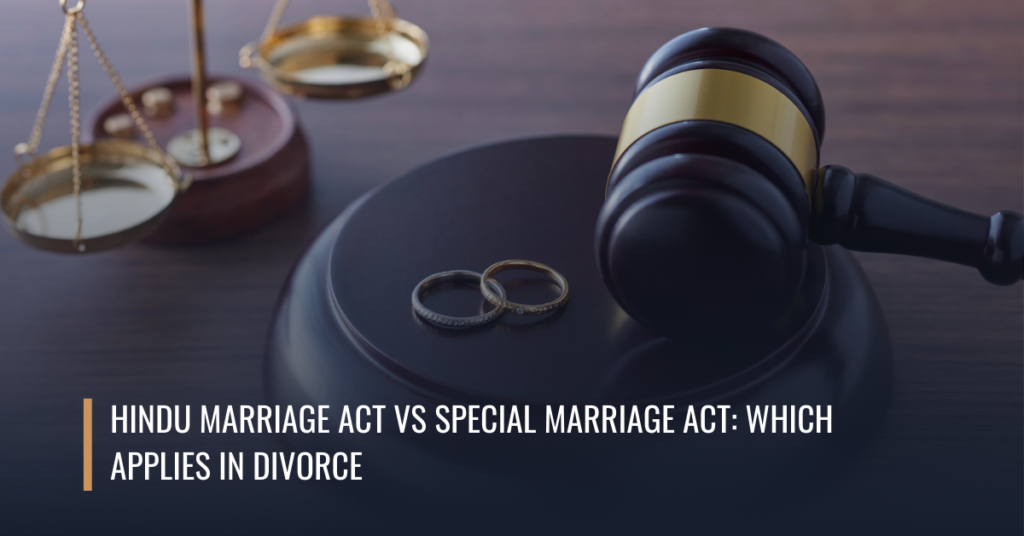Confused about divorce laws in Delhi? Learn the key differences between the Hindu Marriage Act and the Special Marriage Act, including legal grounds, sections, and processes.
Table of Contents
ToggleTable of Contents
- Introduction: Understanding Divorce Laws in Delhi
- Hindu Marriage Act, 1955
- Special Marriage Act, 1954
- Key Differences Between Hindu Marriage Act & Special Marriage Act
- Which Law Applies to Your Divorce?
- Where to File for Divorce in Delhi?
- Conclusion
Introduction: Understanding Divorce Laws in Delhi

In India, divorce law varies according to the different types of marriages, mostly governed by religion and registration, which poses problems throughout the legal process. If you are considering a divorce in Delhi, the first step will be to understand whether your marriage falls under the scope of the Hindu Marriage Act, 1955, or the Special Marriage Act, 1954. The Hindu Marriage Act applies to marriages of Hindus, Buddhists, Jains, and Sikhs, whereas the Special Marriage Act deals with matters concerning interfaith marriages and civil marriages.
Divorce processes differ depending on which law applies. The Hindu Marriage Act recognizes religious customs and traditions, while the Special Marriage Act is secular. Mutual consent divorce and divorce contested for grounds such as adultery, cruelty, desertion, or mental illness are provided under both laws.
In Delhi, family courts in Saket, Patiala House, Tis Hazari, Rohini, Karkardooma, Dwarka, and Rouse Avenue entertain divorce petitions. Knowing which law governs your case is paramount to a smooth divorce process. If there is still doubt regarding the law under which your marriage falls, consulting into the matter with a qualified divorce lawyer can be very helpful in defining your rights and obligations. Only informed decisions can lessen the emotional and legal burden of a divorce.
Hindu Marriage Act, 1955
The Hindu Marriage Act (HMA), 1955, applies to Hindus, Buddhists, Jains, and Sikhs. If you were married under this law, your divorce process will follow the provisions outlined in this act.
Grounds for Divorce Under Section 13 of HMA
A spouse can file for divorce under the Hindu Marriage Act on the following grounds:
- Adultery (Section 13(1)(i)) – If a spouse has engaged in extramarital relations.
- Cruelty (Section 13(1)(ia)) – Physical or mental abuse.
- Desertion (Section 13(1)(ib)) – If a spouse abandons the other for at least two years.
- Conversion (Section 13(1)(ii)) – If a spouse converts to another religion.
- Mental Disorder (Section 13(1)(iii)) – If a spouse suffers from a severe mental disorder.
- Leprosy & Communicable Diseases (Section 13(1)(iv) & (v)) – Incurable conditions leading to social ostracization.
- Renunciation of the World (Section 13(1)(vi)) – If a spouse becomes a sanyasi.
- Presumption of Death (Section 13(1)(vii)) – If a spouse is missing for seven years.
Mutual Divorce Under Section 13B
If the couple mutually agrees to divorce, they can approach the court for mutual consent divorce under Section 13B on the condition that they have lived separately for one year and cannot be reconciled.
Divorces under the Hindu Marriage Act tend to go more smoothly if consent is mutual. Contested divorces may, however, take years as a result of judicial complexities and counterclaims.
Special Marriage Act, 1954
The Special Marriage Act, [SMA], 1954 applies in the case of interfaith or civil marriage. Dissolution of marriage under this act is dealt with through a different legal straight.
Grounds for Divorce Under Section 27 of SMA
A divorce petition can be filed under the following conditions:
- Adultery (Section 27(1)(a)) – If a spouse engages in an extramarital affair.
- Cruelty (Section 27(1)(b)) – Mental or physical abuse.
- Desertion (Section 27(1)(c)) – If a spouse leaves for at least two years.
- Imprisonment (Section 27(1)(d)) – If a spouse is sentenced to seven years or more in jail.
- Mental Disorder (Section 27(1)(e)) – Severe psychiatric conditions making cohabitation impossible.
- Venereal Disease (Section 27(1)(f)) – Incurable sexually transmitted diseases.
- Presumption of Death (Section 27(1)(g)) – If a spouse is missing for at least seven years.
Mutual Divorce Under Section 28
Mutual consent divorce requires one year of separation and joint agreement before filing. Unlike the Hindu Marriage Act, the Special Marriage Act provides more legal formalities, making the process slightly more complicated.

Key Differences Between Hindu Marriage Act & Special Marriage Act
The Hindu Marriage Act applies only to Hindus, Buddhists, Jains, and Sikhs, whereas the Special Marriage Act is for interfaith or civil marriages. Divorce grounds under both laws are similar, but the filing and procedural aspects differ.
One major distinction is that under the Hindu Marriage Act, certain traditional and religious customs are taken into account when granting a divorce, whereas the Special Marriage Act follows a completely civil and secular approach.
Moreover, while both acts allow for mutual divorce, the waiting period for couples under SMA is stricter, as interfaith marriages sometimes involve additional scrutiny.
Which Law Applies to Your Divorce?
Determining whether your divorce falls under the Hindu Marriage Act or Special Marriage Act depends on:
- Your Religion – If both partners are Hindus, the HMA applies. If interfaith, the SMA applies.
- Type of Marriage Registration – If the marriage was solemnized under the Special Marriage Act, divorce must follow SMA provisions.
- Legal Grounds – The conditions for divorce differ slightly in both acts.
Where to File for Divorce in Delhi?
Divorce petitions in Delhi can be filed at:
- Family Courts in Saket, Patiala House, Tis Hazari, Rohini, Karkardooma, Dwarka, and Rouse Avenue
- Online through the Delhi e-Court portal
Conclusion
Knowing the difference between the two legal setups is essential for finding the right one. If you are still in the dark about the procedures, taking counsel from a family lawyer in Delhi would smoothen the way for you.

Want best lawyer for your divorce or civil case? Click Here

